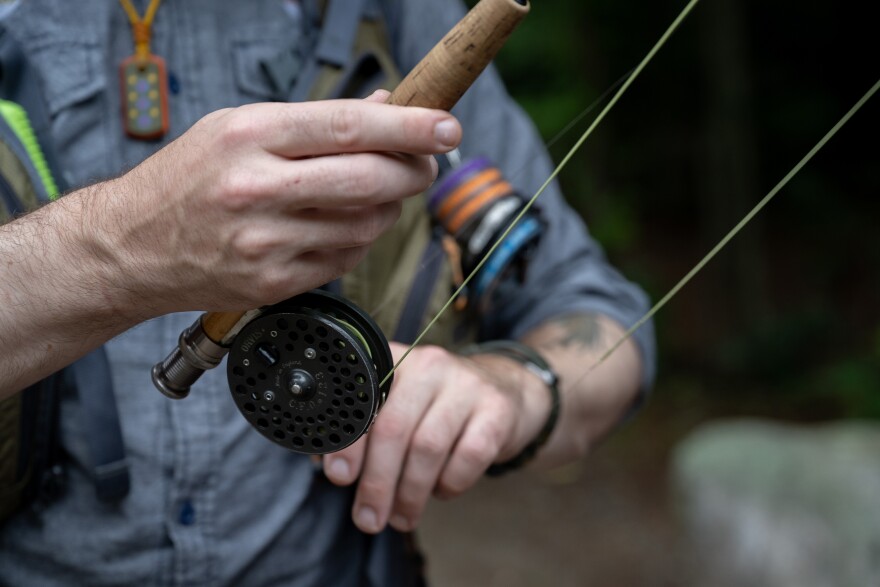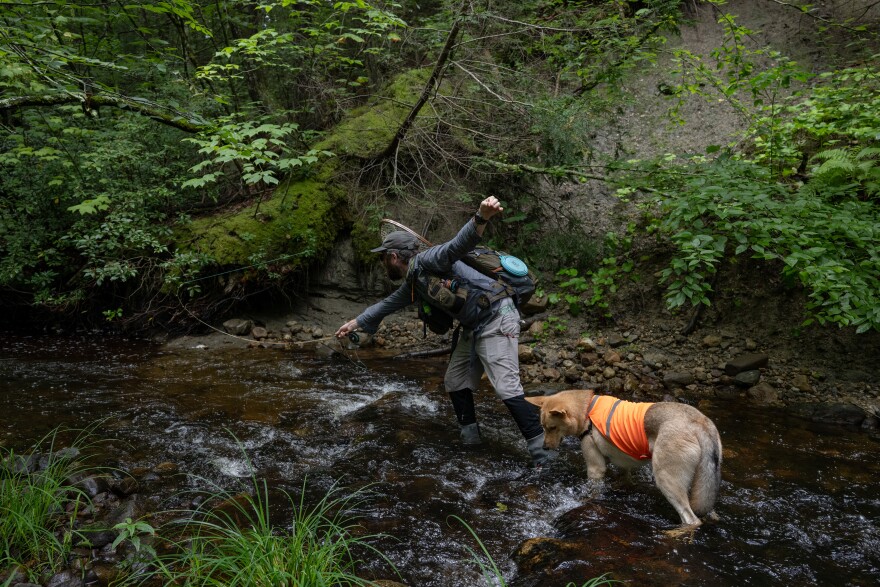As Geoff Klane secured a homemade fly to the end of his fishing line, the rushing waters of the nearby Trapfall Brook in northern Massachusetts seemed louder to him than usual.

Moments earlier, Klane had peered inside his colorful fly box, debating which fly to use. He had landed on a fluffy, orange number nicknamed the “One-Eyed Poacher,” certain it would do just fine for the brook trout swimming these waters, even though the “Poacher” was designed for salmon in Maine.
Both of those cold-water fish, the Atlantic salmon and brook trout, are native to New England and have long been treasured by the region's fly fishers. They also share a more somber trait: Both species are now suffering from the impacts of the region’s more intense rains, warming summers and frequent dry spells.
When the fish in any given waterway are stressed, many anglers consider it unethical to cast a line there. That, along with the wildly unpredictable conditions of local rivers, have some fly fishers reporting challenges to their industry.
“This year in particular, the rain has been absolutely astounding,” Klane said, noting how the swollen Trapfall Brook is usually "just a trickle" this time of year.
His guide service, Brackish Flies, has resorted to rescheduling and even canceling some fly fishing trips, he said.
“When it's too low, it often gets too warm and there just aren't sufficient places for the fish to hide," he said. "When it's too high, it's flowing too quickly. You can't really get a fly down to where you need it to be, or the water is very turbid and mixed up and there's a lot of sediment."
“When it's too low ... there just aren't sufficient places for the fish to hide. When it's too high, it's flowing too quickly. You can't really get a fly down to where you need it to be."GEOFF KLANE, FLY FISHING GUIDE
Anglers have always had to fish around the weather.
The July numbers are in & this probably comes at no surprise...
— NWS Boston (@NWSBoston) August 1, 2023
It was the wettest July on record for Hartford & the second wettest in Boston, Providence, & Worcester.#ctwx #mawx #riwx pic.twitter.com/3CXmGQ6agt
But weather events are becoming more extreme. According to the National Weather Service in Boston, this July was the second wettest on record. Last July, meanwhile, was the third hottest on record.
And while the whiplash between floods and drought isn't ideal for guides like Klane, fly fishing is more than a business: at its heart is a sort of reverence for the actual fish and their marvelous behaviors.
Many anglers are asking: Is climate change affecting the fish, too?
“The answer is definitely yes,” said Dr. Helen Neville, the top scientist at Trout Unlimited, a conservation nonprofit. “I mean, we are seeing a lot of impacts on fish, from impacts in the East of both warming stream temperatures and, of course, the extreme flooding events.”
Patrick Berry, president and CEO of Fly Fishers International, an education and conservation group, said scientific studies have proven how climate change is hurting fish in the Northeast. He saw some of those impacts this summer where he lives in Vermont, a state that saw catastrophic and unprecedented floods.
Floods, in particular, can destroy a fish’s food and nutrients — and especially hurt younger fish that aren't as resilient.
“We're already seeing that you can wipe out entire age classes of fish when you have these constant flooding events that scour stream bottoms and fundamentally change the nature of the river," Berry said.
"You can wipe out entire age classes of fish when you have these constant flooding events."PATRICK BERRY, PRESIDENT AND CEO OF FLY FISHING INTERNATIONAL
Human development exacerbates climate change
Berry and Neville agree that humans can mitigate the impact of climate change on these cold-water species. Their groups are scrambling to increase awareness among their members, while at the same time trying to change policy through strategic partnerships.

Both groups signed on to a letter last year urging the Biden administration to work climate resiliency into its infrastructure plans, offering solutions like upsizing culverts in Vermont.
Berry says human development has led to several negative consequences on waterways and their inhabitants. As a result, many streams are more shallow than before, and they contain elevated levels of phosphorous and nitrogen due to wastewater treatment plants and runoff from large farms.
"And then you put climate change on top of that. It actually exacerbates those problems so that, instead of 1 + 1 = 2 in terms of problems, you end up with 1 + 1 = 5," Berry said.


Still, it's been a struggle trying to convince some grassroots anglers that climate change presents a dire risk to their cherished tradition, Berry said.
"There are certainly still some folks within our community who are skeptical of the impacts of climate change and whether or not it's caused by human disturbance," he said.
But he is also heartened by the special relationship fly fishers have to the natural environment: to be successful, they've got to study the fish's habitat, understanding how the fish are likely to behave in various scenarios.
Solutions for more resilient habitats
Neville said one opportunity lies in reconnecting waterways where human-made barriers prevent fish from swimming to more habitable spots. That would entail changes to the "hundreds of thousands" of dams and culverts in the East.
“The vast majority of our populations nationally — and definitely in the Northeast with brook trout, for instance — are now isolated. And so they are only able to occupy these small patches of headwater streams," Neville said.
She added that while focusing conservation efforts on those small patches is valuable, a broader scope is needed to more fully aid these species.
“We tend to manage only for these cold-water habitats. But I’m trying to emphasize that in other parts of the season, they use these downstream places to grow. In the other parts of the season — spring and fall — they use other habitats to grow,” Neville said.

And as fish get larger, they can produce more eggs, leading to healthier populations.
Neville said thermal warming and disrupted habitats are serious problems. At the same time, she said, it's not "all doom and gloom."
"I think with that human legacy comes an opportunity, right?" she said. "That means that there are things that are in our control."




